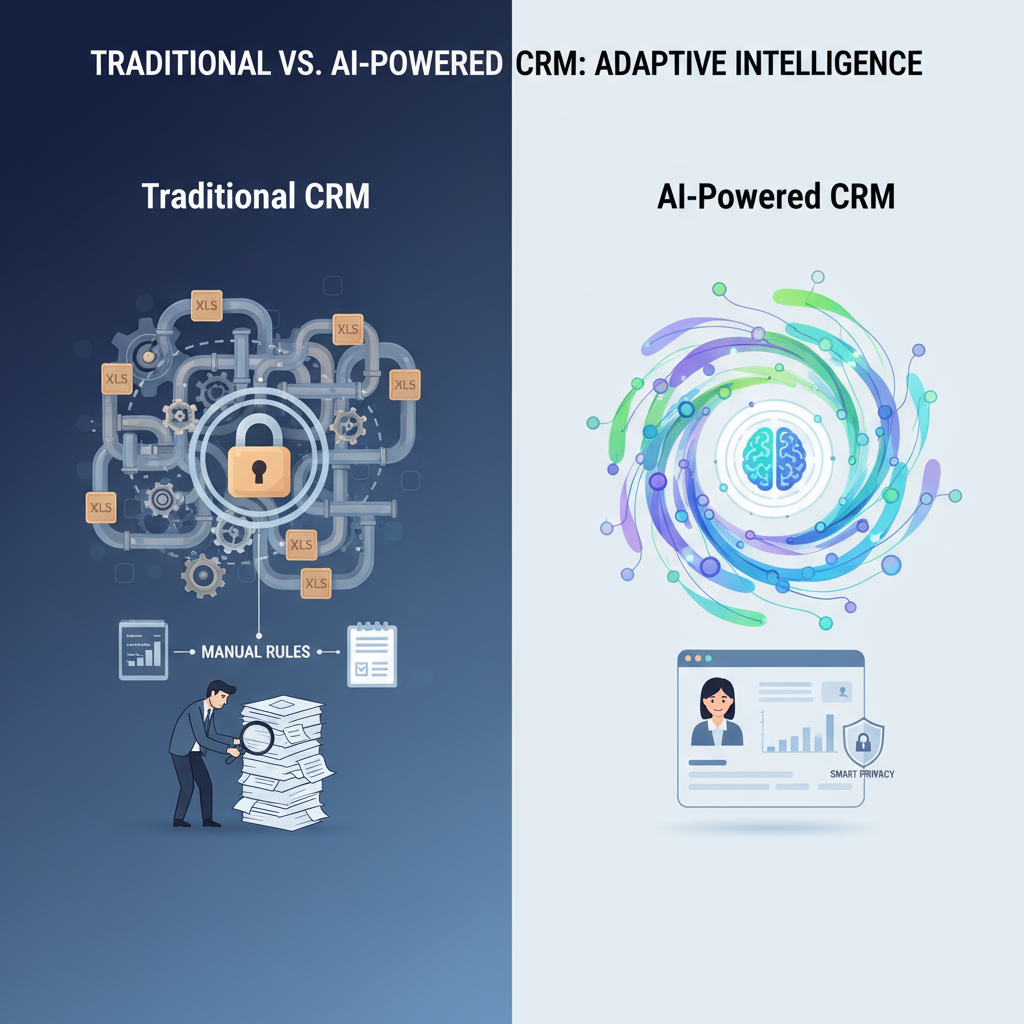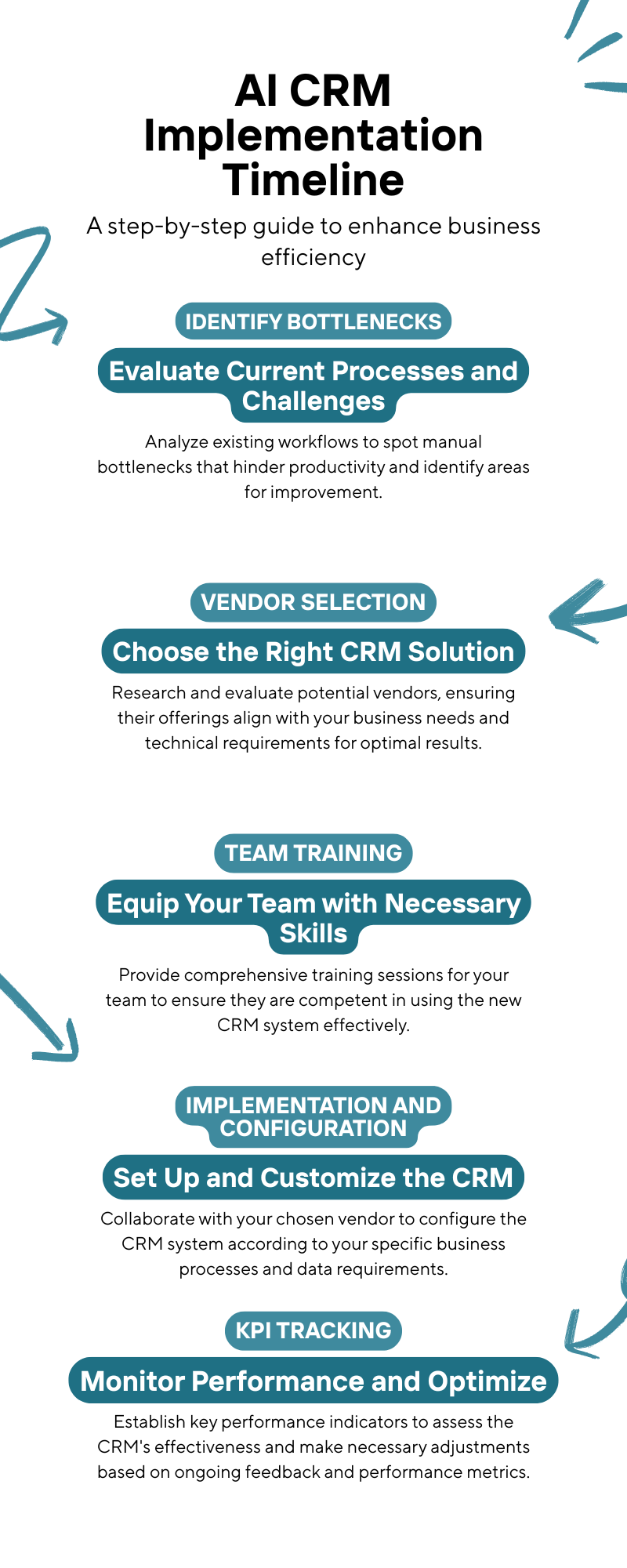CRM Automation with AI: A Comprehensive Guide to Transforming Sales Processes

Manual CRM tasks waste 20% of sales reps' time – but there's a solution that's revolutionizing how teams work. AI-powered CRM automation uses machine learning to automate sales workflows, predict customer behavior, and prioritize high-value leads, helping companies achieve 30% faster deal closures.
In this comprehensive guide, we'll explore how CRM automation with AI is transforming sales processes and provide you with a practical roadmap for implementation, including a free buyer's checklist to guide your journey.
Key Takeaways
- AI-driven CRM automation helps teams achieve 25–30% faster sales cycles and 20%+ revenue uplift through smarter prioritization and automation.
- Intelligent pipeline automation can reduce human error by up to 40% while boosting forecasting accuracy.
- Behavior-triggered email sequences increase reply rates by ~25% without sacrificing personalization.
- AI lead scoring using 50+ intent and firmographic signals delivers a 15% average lift in conversions.
- A structured 4-month rollout (assessment → integration → training → optimization) accelerates time-to-value.
Table of Contents
- 1. What is CRM Automation with AI?
- 2. Why AI-Driven CRM Automation Matters
- 3. Key Features to Evaluate
- 4. Implementation Roadmap
- 5. Top Tools for CRM Automation with AI
- 6. Making the Transition
- 7. Conclusion + Next Steps
- FAQ
1. What is CRM Automation with AI?
AI-powered CRM automation applies machine learning to streamline sales workflows, reduce manual data entry, and deliver predictive insights across the funnel. From lead scoring and next-best-action recommendations to automated follow-ups and dynamic forecasting, AI helps teams focus on selling—not admin.
The winning sales teams automate repeatable tasks and spend their effort where it matters most: high-value conversations.
2. Why AI-Driven CRM Automation Matters
Sales Pipeline Automation: Smarter Deal Management
CRM automation with AI is revolutionizing how sales teams manage their pipelines. By leveraging historical data, AI systems can forecast deal probabilities with unprecedented accuracy and automatically prioritize tasks for maximum impact. This intelligent automation reduces human error in pipeline management by 40%, ensuring your team focuses on the most promising opportunities.
Need help optimizing your sales pipeline? Contact now for expert guidance.
Email Follow-Up Automation: Never Miss an Opportunity
Modern AI-driven CRMs excel at behavior-triggered sequences that boost reply rates by 25%. For example, when a lead opens three emails but doesn't reply, the system automatically sends a personalized video message. This level of sophisticated automation ensures consistent follow-up while maintaining a personal touch.
AI for Lead Scoring: Precision Targeting
Using more than 50 different signals, including engagement metrics and firmographic data, AI-powered lead scoring systems provide real-time lead ranking. Companies implementing these systems report a 15% average increase in conversion rates, as sales teams can focus their efforts on the most promising prospects.
Source: CETDIGIT, 2025
3. Key Features to Evaluate

When selecting a CRM automation with AI solution, consider these critical features:
-
Integration Capabilities
- Email platform compatibility (Gmail, Outlook)
- ERP system integration
- Marketing tool synchronization
-
Custom AI Models
- Industry-specific workflow customization
- Adaptable learning algorithms
- Bespoke prediction models
-
Scalability
- Handling of 10x data volume spikes
- Performance during peak sales periods
- User expansion flexibility
-
GDPR Compliance
- End-to-end encryption
- Role-based access controls
- Data privacy safeguards
Source: SuperAGI, 2025
4. Implementation Roadmap

-
Audit CRM Gaps
- Identify manual bottlenecks (e.g., data entry, handoffs, approvals).
- Teams typically waste ~5 hours per week on data entry alone – time reclaimed via automation.
-
Vendor Selection
- Compare 3–5 tools using our comprehensive checklist.
- Prioritize vendors offering sandbox environments for testing.
-
Team Training
- Focus on interpreting AI-generated lead scores.
- Manage automation rules and guardrails.
- Iterate workflows based on outcomes.
-
KPI Tracking
- Monitor response time (target: <2 hours).
- Track conversion rate improvements.
- Measure deal velocity acceleration.
Ready to implement AI-driven CRM automation? Contact Now for expert consultation.
5. Top Tools for CRM Automation with AI
Salesforce Einstein
- Enterprise-grade solution
- Real-time forecasting capabilities
- Consumption-based pricing model
- Ideal for large organizations
HubSpot AI
- Starting at $800/month
- Drag-and-drop workflow automation
- Excellent mid-market solution
- Robust integration capabilities
SuperAGI Agentic CRM
- Custom pricing options
- Specialized for SMBs
- Bespoke AI agents
- Industry-specific workflows
Mitrix AI Agents
- Complex sales environment focus
- Custom integration options
- Advanced workflow automation
- Specialized use cases
Source: Mitrix, 2025
6. Making the Transition
Successfully implementing CRM automation with AI requires careful planning and execution. Here's a suggested timeline:
- Month 1: Assessment and vendor selection
- Month 2: Initial setup and integration
- Month 3: Team training and pilot program
- Month 4: Full rollout and optimization
Tip: Start with a narrowly scoped pilot (one segment, one workflow). Prove ROI, then scale.
7. Conclusion + Next Steps
CRM automation with AI represents a transformative opportunity for sales organizations, offering 25–30% faster sales cycles and 20%+ revenue growth potential. The key to success lies in choosing the right solution and implementing it strategically.
Take action: Contact Now for personalized implementation guidance
FAQ
-
What is the difference between traditional CRM and AI-powered CRM?
- Traditional CRMs store and track data; AI-powered CRMs analyze patterns, predict outcomes, and automate next-best actions, cutting manual work and improving win rates.
-
How quickly can we see ROI from AI CRM automation?
- Many teams see early wins within 60–90 days via automated follow-ups and lead scoring, with broader pipeline and forecasting impact by 120 days.
-
Do we need data scientists to run AI features?
- Not necessarily. Most modern platforms provide no-code/low-code AI features. For bespoke models, consider vendor services or a phased approach with limited customization first.
-
Will automation make our outreach feel robotic?
- Done right, it’s the opposite. AI orchestrates timing and personalization at scale. Use human-validated templates, clear guardrails, and periodic audits to keep quality high.
-
How do we handle compliance and data privacy?
- Choose vendors with robust encryption, role-based access, and audit logs. Confirm GDPR/CCPA features and establish a data retention policy before rollout.
-
Can you help us choose the right tool and set it up?
- Yes. For assessments, vendor shortlists, and implementation support, Contact Now.
Ready to transform your sales process with AI-powered CRM automation? Contact Now.